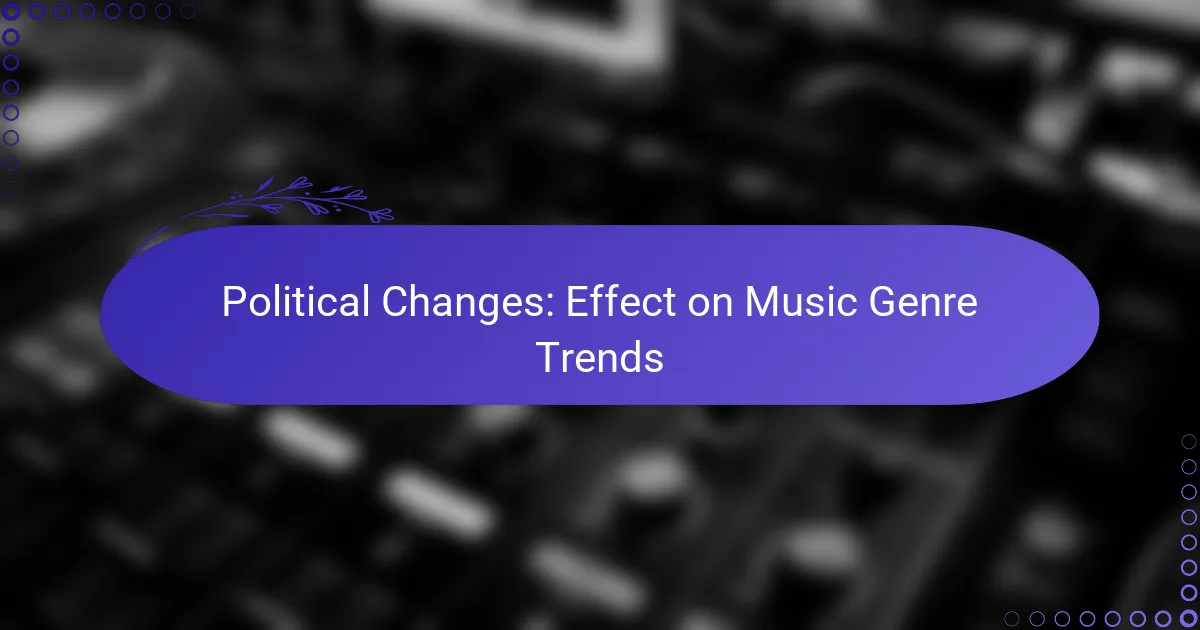Political changes play a crucial role in shaping music genre trends, as artists often respond to societal issues through their creative expressions. Throughout history, music has served as a reflection of political climates, with genres evolving in response to movements and events that resonate with the public. Today, contemporary political events continue to inspire musicians, leading to the exploration of new sounds and themes that capture the zeitgeist of our times.
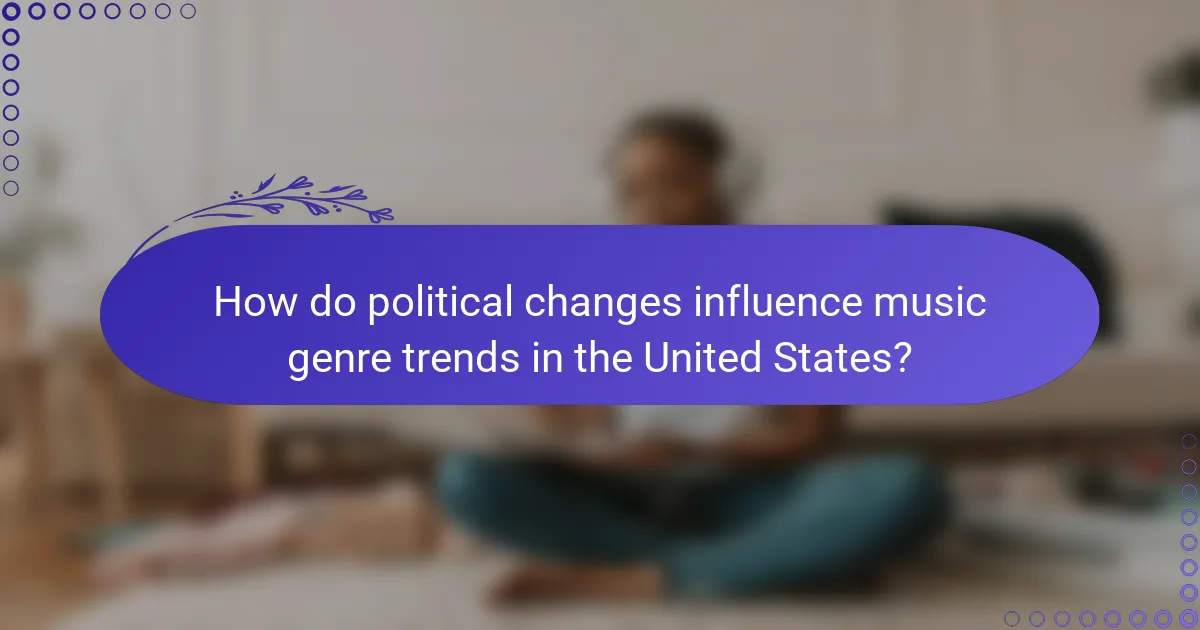
How do political changes influence music genre trends in the United States?
Political changes significantly shape music genre trends in the United States by inspiring artists to respond to societal issues through their work. As political climates shift, musicians often reflect these changes in their lyrics, themes, and overall sound, leading to the rise of specific genres that resonate with the public’s sentiments.
Shift towards protest music
The rise of protest music often correlates with periods of political unrest or social movements. Artists like Bob Dylan and Joan Baez in the 1960s exemplified how music can serve as a powerful tool for social change, addressing civil rights and anti-war sentiments. Today, contemporary artists continue this tradition, using their platforms to speak out against issues such as racial injustice and climate change.
Protest music typically features straightforward lyrics that convey strong messages. This genre can be effective in mobilizing listeners and fostering a sense of community among those who share similar beliefs. Musicians often collaborate with activists to amplify their impact, creating a synergy between music and social movements.
Emergence of politically charged hip-hop
Hip-hop has increasingly become a medium for political expression, particularly among younger generations. Artists like Kendrick Lamar and J. Cole address systemic issues such as inequality, police brutality, and economic disparity through their lyrics. This genre’s roots in marginalized communities make it a natural outlet for political commentary.
The genre’s evolution reflects broader societal concerns, with tracks often serving as a response to current events. Politically charged hip-hop can inspire activism and provoke discussions, making it a vital part of the cultural landscape. Collaborations with social justice organizations further enhance its reach and relevance.
Impact on country music themes
Country music has also been influenced by political changes, particularly in its themes and storytelling. Traditionally associated with rural life and working-class struggles, the genre has seen a shift towards addressing contemporary political issues such as immigration and gun control. Artists like Kacey Musgraves and Chris Stapleton incorporate these themes into their work, reflecting the evolving concerns of their audience.
As political landscapes change, country music often adapts by blending traditional sounds with modern influences. This evolution allows artists to connect with a broader audience while maintaining their roots. Country music’s storytelling tradition provides a unique platform for exploring complex social issues, making it relevant in today’s political climate.
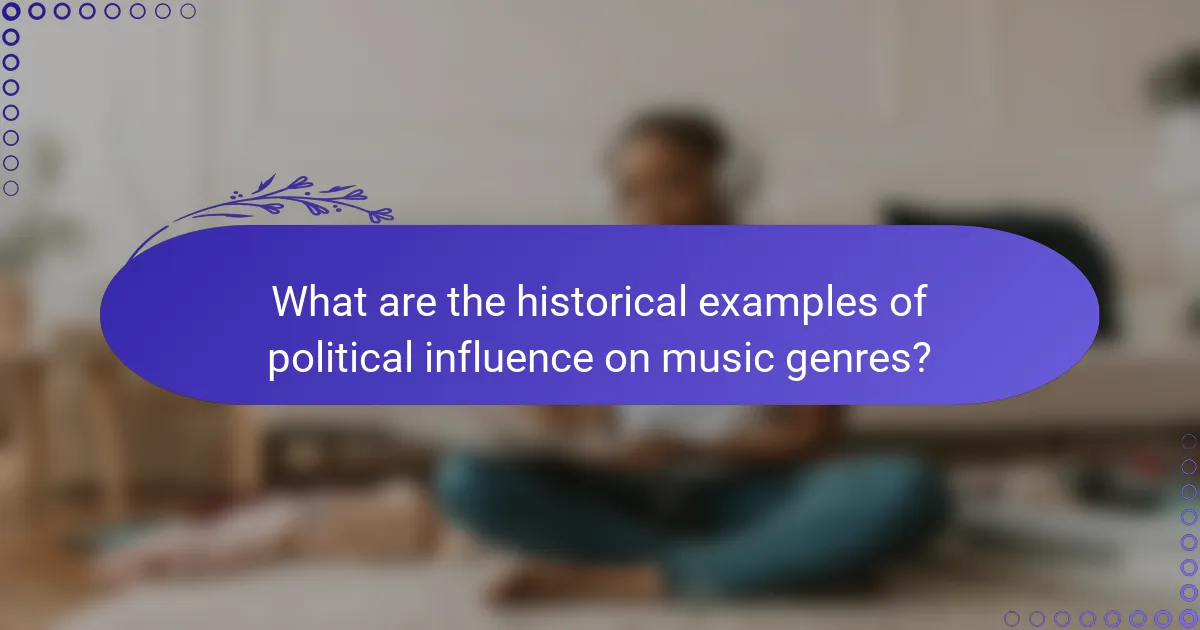
What are the historical examples of political influence on music genres?
Political events have significantly shaped music genres throughout history, often reflecting societal sentiments and movements. From civil rights to war protests, music has served as both a voice for change and a means of expression during turbulent times.
1960s civil rights movement and folk music
The civil rights movement of the 1960s had a profound impact on folk music, as artists used their platforms to advocate for social justice and equality. Songs like “We Shall Overcome” became anthems for the movement, embodying the struggles and aspirations of African Americans seeking civil rights.
Folk musicians such as Bob Dylan and Joan Baez played pivotal roles, blending personal narratives with broader social issues. Their music not only raised awareness but also mobilized listeners, encouraging them to participate in protests and rallies.
Vietnam War and rock music evolution
The Vietnam War catalyzed a transformation in rock music, as artists began to address the conflict’s moral complexities and societal repercussions. Songs like “Fortunate Son” by Creedence Clearwater Revival criticized the class disparities in who was sent to fight, resonating with a generation disillusioned by the war.
This period saw the rise of protest rock, where musicians used their art to challenge government policies and advocate for peace. The genre evolved to include a variety of styles, from psychedelic rock to hard rock, reflecting the diverse sentiments of the youth during this era.
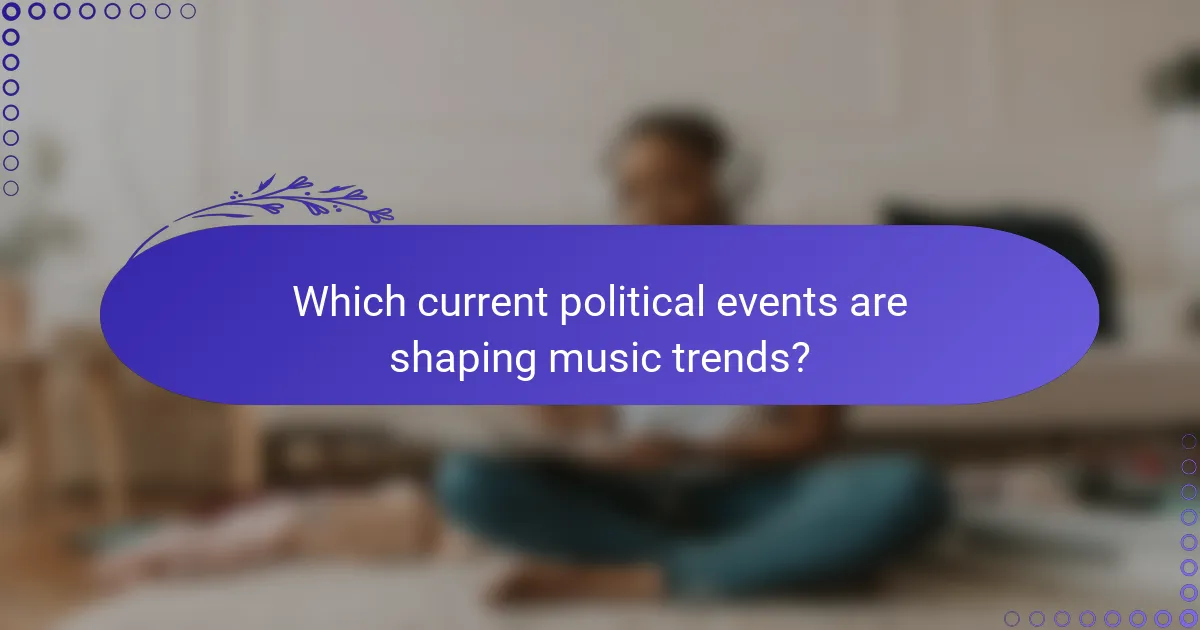
Which current political events are shaping music trends?
Current political events, such as social justice movements and global health crises, are significantly influencing music trends. These events prompt artists to explore new genres and formats, reflecting societal changes and audience demands.
Black Lives Matter and genre diversification
The Black Lives Matter movement has led to a notable diversification in music genres, as artists increasingly incorporate themes of social justice and racial equality into their work. Genres like hip-hop, R&B, and pop have seen a surge in songs addressing systemic racism and police brutality.
This shift encourages collaboration across genres, with artists from different backgrounds blending styles to create unique sounds. For example, collaborations between hip-hop artists and rock or country musicians have become more common, appealing to a broader audience and fostering inclusivity.
COVID-19 pandemic and virtual concerts
The COVID-19 pandemic has transformed the live music landscape, pushing artists to adopt virtual concerts as a primary means of connecting with fans. This shift has led to innovative performances that leverage technology, allowing artists to reach global audiences without geographical limitations.
Virtual concerts often feature interactive elements, such as live chats and virtual meet-and-greets, enhancing fan engagement. Artists and promoters are exploring various platforms, with ticket prices typically ranging from affordable to premium, ensuring accessibility while generating revenue in a challenging environment.
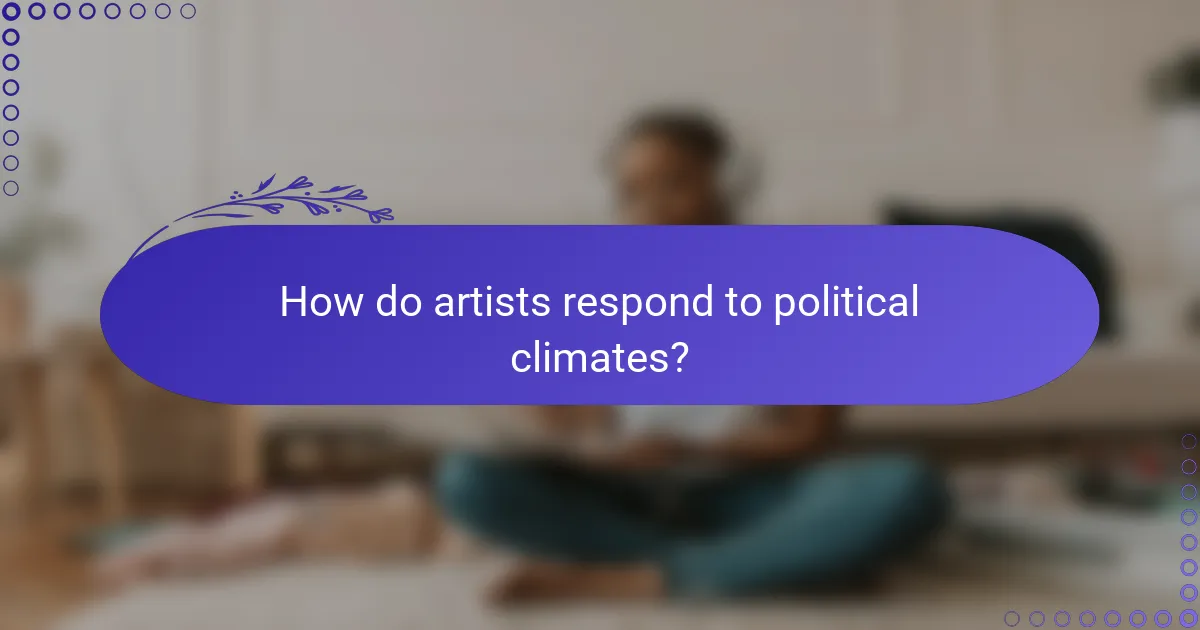
How do artists respond to political climates?
Artists often respond to political climates by using their music to express dissent, raise awareness, or inspire change. This engagement can manifest through lyrical content, collaborations, and public performances that reflect the prevailing social issues.
Lyric changes reflecting social issues
Musicians frequently adapt their lyrics to address current social and political issues, making their work relevant to contemporary audiences. For example, genres like hip-hop and punk rock have historically tackled themes such as inequality, war, and civil rights, often using direct language to provoke thought and action.
In recent years, many artists have incorporated references to movements like Black Lives Matter or climate change into their songs. This shift not only resonates with listeners but also encourages them to engage with these critical topics, fostering a sense of community and activism.
Collaborations across genres for activism
Collaborations between artists from different genres have become a powerful tool for activism, allowing for a broader reach and impact. For instance, pop stars may team up with hip-hop artists to create songs that highlight social justice issues, blending styles to attract diverse audiences.
These partnerships can amplify messages and mobilize fans, as seen in benefit concerts or charity singles. By combining their platforms, artists can effectively raise funds and awareness for various causes, demonstrating the unifying power of music in times of political strife.
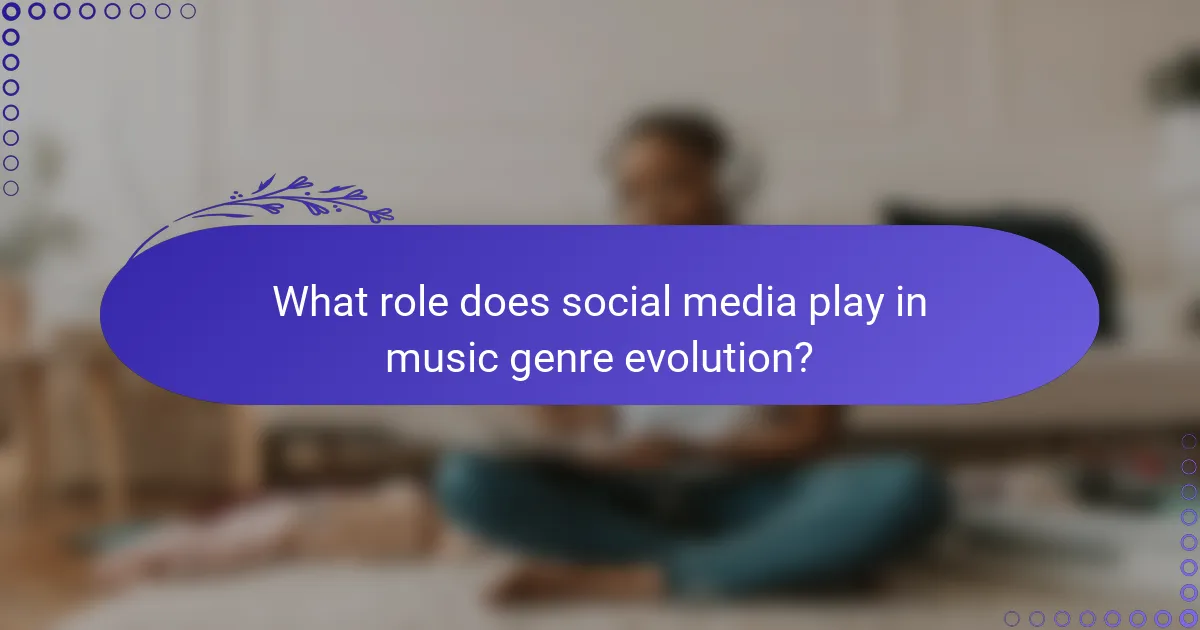
What role does social media play in music genre evolution?
Social media significantly influences music genre evolution by facilitating rapid sharing and discovery of new sounds and trends. Platforms allow artists to connect directly with audiences, leading to shifts in genre popularity based on viral content and user engagement.
Viral trends driven by political discourse
Political discourse often sparks viral trends that shape music genres. For instance, songs addressing social justice issues can gain traction during movements, leading to a resurgence of genres like hip-hop and folk that emphasize storytelling and activism. Artists who engage with current events can quickly capture the public’s attention, driving genre shifts.
Examples include tracks that gain popularity during elections or protests, where lyrics resonate with listeners’ sentiments. This creates a feedback loop where the music not only reflects societal issues but also influences public opinion and engagement.
Influence of platforms like TikTok on genre popularity
Platforms like TikTok play a crucial role in determining which music genres gain popularity. The app’s short-form video format encourages users to create content that often features specific songs, leading to viral challenges and trends that can elevate lesser-known genres to mainstream status.
For example, the rise of lo-fi hip-hop and indie pop can be attributed to TikTok’s user-generated content, where catchy hooks and relatable themes resonate with a younger audience. Artists can leverage these trends by creating engaging content that aligns with viral challenges, maximizing their reach and impact.
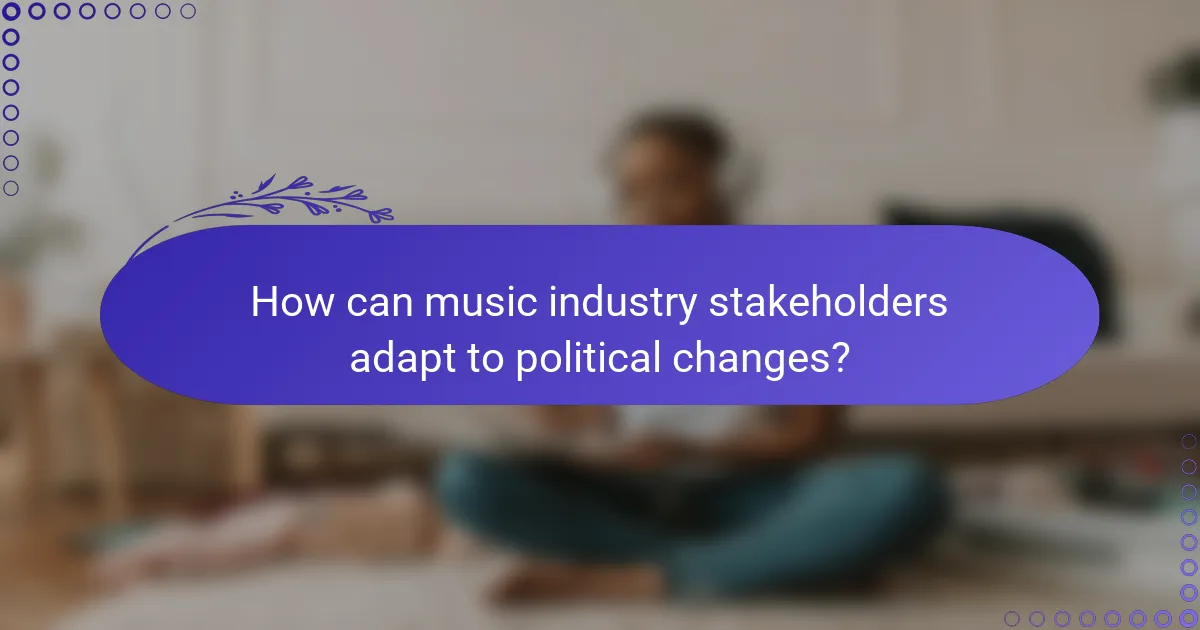
How can music industry stakeholders adapt to political changes?
Music industry stakeholders can adapt to political changes by staying informed about current events and understanding their impact on audience preferences. By aligning their strategies with the socio-political climate, they can better promote relevant artists and adjust marketing efforts to resonate with listeners.
Strategies for promoting politically relevant artists
To effectively promote politically relevant artists, stakeholders should highlight the themes and messages in their music that resonate with current societal issues. This can involve creating campaigns that showcase the artist’s stance on political matters, using social media platforms to amplify their voice and connect with audiences who share similar values.
Collaborations with organizations or movements that align with the artist’s message can also enhance visibility. For instance, partnering with non-profits or participating in benefit concerts can draw attention and support for both the artist and the cause, creating a mutually beneficial relationship.
Adjusting marketing approaches based on current events
Marketing strategies must be flexible and responsive to current events. Stakeholders should monitor news cycles and social media trends to identify opportunities for timely engagement. For example, launching campaigns that tie into major political events or movements can capture audience interest and drive engagement.
Utilizing targeted advertising that reflects the political climate can also be effective. This might include creating content that speaks directly to the concerns of specific demographics, ensuring that messaging is relevant and resonates with listeners’ experiences. Regularly reviewing analytics can help refine these approaches for better results.
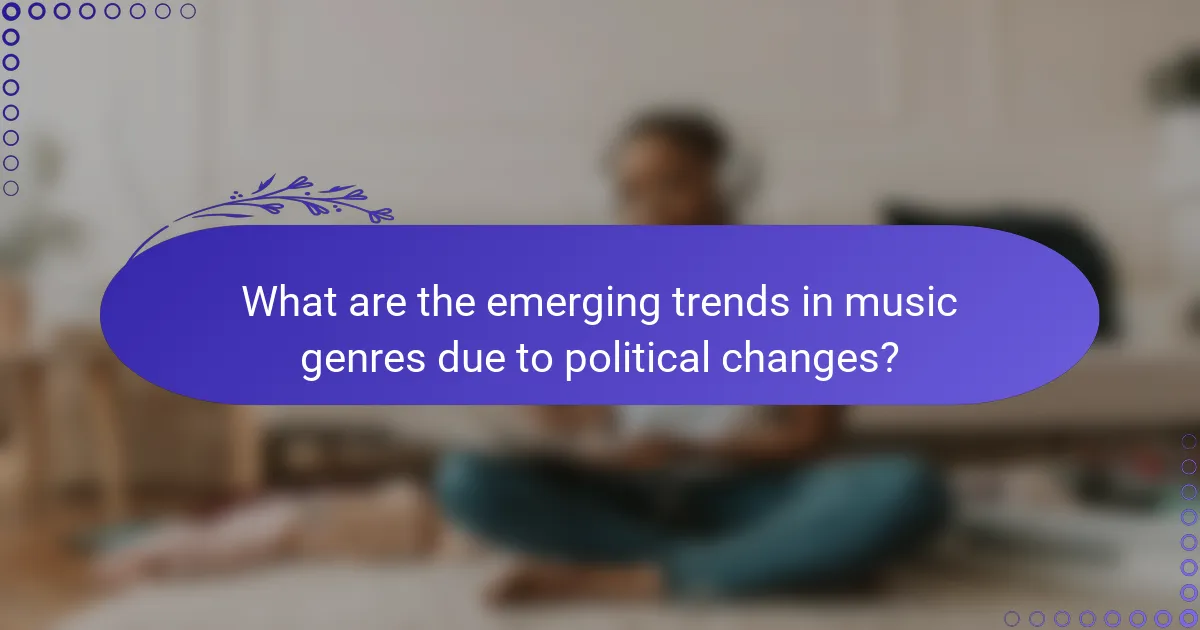
What are the emerging trends in music genres due to political changes?
Political changes significantly influence music genre trends by shaping the themes, styles, and popularity of various genres. Artists often respond to social movements, governmental policies, and cultural shifts, leading to the emergence of new sounds and lyrical content that reflect the current political climate.
Impact of Social Movements on Music
Social movements play a crucial role in shaping music genres by inspiring artists to create works that resonate with their audiences’ sentiments. For instance, genres like hip-hop and punk often emerge or gain prominence during times of political unrest, as they provide a platform for expressing dissent and advocating for change.
In recent years, movements such as Black Lives Matter have led to a resurgence of politically charged music, with artists using their platforms to address issues of racial injustice and inequality. This has resulted in a blend of traditional genres with contemporary sounds, creating new subgenres that reflect these themes.
Government Policies and Music Trends
Government policies can directly affect music trends by influencing funding, censorship, and access to resources for artists. For example, countries that support the arts through grants and subsidies often see a flourishing music scene, while those with restrictive policies may stifle creativity and limit genre diversity.
In regions where censorship is prevalent, artists may turn to underground movements to express their views, leading to the rise of genres that challenge the status quo. This can result in unique sounds that blend traditional music with modern influences, creating a rich tapestry of cultural expression.
Globalization and Genre Fusion
Globalization has facilitated the fusion of diverse musical genres, driven by political changes that encourage cultural exchange. As artists from different backgrounds collaborate, new genres emerge that blend elements from various musical traditions, reflecting a more interconnected world.
For example, the rise of reggaeton and K-pop showcases how political and cultural shifts can lead to the blending of genres across borders. This trend not only expands the musical landscape but also promotes cross-cultural understanding and appreciation.
